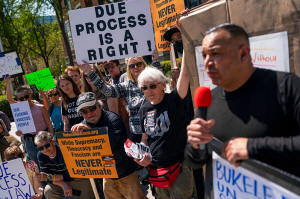Trump says he wants to imprison US citizens in El Salvador. That's
likely illegal
[April 16, 2025]
By NICHOLAS RICCARDI
President Donald Trump on Monday reiterated that he'd like to send U.S.
citizens who commit violent crimes to prison in El Salvador, telling
that country's president, Nayib Bukele, that he'd “have to build five
more places” to hold the potential new arrivals.
Trump's administration has already deported immigrants to El Salvador's
notorious mega-prison CECOT, known for its harsh conditions. The
president has also said his administration is trying to find “legal”
ways to ship U.S. citizens there, too.
Trump on Monday insisted these would just be “violent people,” implying
they would be those already convicted of crimes in the United States,
though he's also floated it as a punishment for those who attack Tesla
dealerships to protest his administration and its patron, billionaire
Elon Musk. But it would likely be a violation of the U.S. Constitution
for his administration to send any native-born citizen forcibly into an
overseas prison. Indeed, it would likely even violate a provision of a
law Trump himself signed during his first term.
Here's a look at the notion of sending U.S. citizens to prison in a
foreign country, why it's likely not legal and some possible legal
loopholes.
If it's legal to do to immigrants, why not citizens?
Immigrants can be deported from the United States, while citizens
cannot. Deportation is covered by immigration law, which does not apply
to U.S. citizens. Part of being a citizen means you cannot be forcibly
sent to another country.

Immigrants can be removed, and that's what's been happening in El
Salvador. The country is taking both its own citizens that the United
States is sending as well as those from Venezuela and potentially other
countries that will not take their own citizens back from the U.S. The
Venezuelans sent there last month had no opportunity to respond to
evidence against them or appear before a judge.
That's the deal the Trump administration signed with Bukele. The U.S.
has sent people to El Salvador, Costa Rica, Panama and elsewhere even
when they are not citizens of those countries. But, under international
agreements, people cannot be sent to countries where they are likely to
be persecuted or tortured.
Why does the Trump administration want to send people to El Salvador?
Bukele calls himself “the world's coolest dictator” and has cracked down
on human rights during his administration. He's also turned El Salvador
from one of the world's most violent countries into a fairly safe one.
Trump has embraced that example, including during the Oval Office visit
Monday.
Sending immigrants from countries like Venezuela to El Salvador sends a
message to would-be migrants elsewhere about the risks of trying to make
it to — or stay in — the United States.
There's a second benefit to the administration: People sent to El
Salvador are outside the jurisdiction of United States courts. Judges,
the administration argues, can't order someone sent to El Salvador to be
released or shipped back to the U.S. because the U.S. government no
longer has control of them.
It's a potential legal loophole that led Supreme Court Justice Sonia
Sotomayor to issue a grim warning in her opinion in a 9-0 U.S. Supreme
Court finding that the administration could not fly alleged Venezuelan
gang members to El Salvador with no court hearing, even after Trump
invoked an 18th century law last used during World War II to claim
wartime powers.

[to top of second column]
|

Protestors chant during a demonstration against President Donald
Trump's use of El Salvador's Terrorism Confinement Center, or CECOT,
prison for people deported from the U.S. for entering the country
illegally, outside the Embassy of El Salvador in Washington, Monday,
April 14, 2025. (AP Photo/Nathan Howard)

“The implication of the Government’s position is that not only
noncitizens but also United States citizens could be taken off the
streets, forced onto planes, and confined to foreign prisons with no
opportunity for redress,” Sotomayor warned. She was writing to
dissent from the majority taking the case from the federal judge who
had initially barred the administration from any deportations and
had ordered planes en route to El Salvador turned around — an order
the administration apparently ignored.
A second case highlights the risks of sending people to El Salvador.
The administration admits it sent a Maryland man, Kilmar Abrego
Garcia, erroneously to El Salvador. A Salvadoran immigrant, Abrego
Garcia, who has not been charged with a crime, had an order against
deportation but was shipped to CECOT anyway. On Monday Bukele and
Trump scoffed at the idea of sending him back, even though the U.S.
Supreme Court ordered the administration to “facilitate” his return.
Wait, so can they send citizens to El Salvador?
Nothing like this has ever been contemplated in U.S. history, but it
seems unlikely. There are other legal barriers besides the fact that
you cannot deport U.S. citizens. The United States does have
extradition treaties with several countries where it will send a
citizen accused of a crime in that country to face trial there. That
appears to be the only existing way a U.S. citizen can be forcibly
removed from the country under current law.
The Constitution also prohibits “cruel and unusual punishment,” and
one of CECOT's selling points is that conditions there are far
harsher than in prisons in the U.S. As noted above, federal courts
have no jurisdiction there, and that may deprive people sent there
of the constitutional guarantee of due process of law.
"It is illegal to expatriate U.S. citizens for a crime," wrote
Lauren-Brooke Eisen of the Brennan Center for Social Justice in New
York.

She noted that even if the administration tries to transfer federal
prisoners there, arguing they're already incarcerated, it could run
afoul of the First Step Act that Trump himself championed and signed
in 2018. The provision requires that the government try to house
federal inmates as close to their homes as possible so their
families can visit them — and indeed transfer anyone housed farther
than 500 miles from their home to a closer facility.
One last loophole?
There is one potential loophole that the administration could use to
send a small group of citizens to El Salvador. They can try to strip
the citizenship of people who earned it after immigrating to the
United States.
People who were made U.S. citizens after birth can lose that status
for a handful of offenses, like funding terrorist organizations or
lying on naturalization forms. They would then revert to green card
holders, and would be potentially eligible for deportation if
convicted of other, serious crimes.
That's a small, but real, pool of people. Perhaps the most
significant thing about it is that it would require loss of
citizenship first. In other words, there's still likely no legal way
to force a citizen out of the country. But a few could end up in
legal jeopardy anyway.
All contents © copyright 2025 Associated Press. All rights reserved |